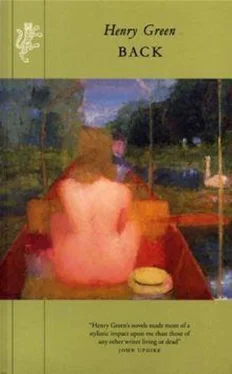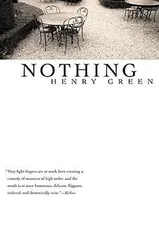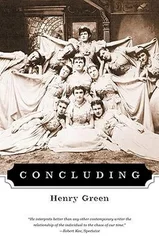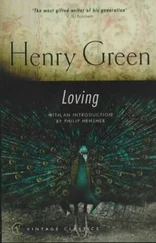Back is the perfect title for this self-reflexive, to-ing and fro-ing novel. The word is loaded with different meanings on which the narrative ruminates almost as naggingly as Charley dwells on the name Rose: “he followed a strange girl … back to what may have been her home”; “‘we all of us came back to what we didn’t expect’”; “he knew it was all right at last, was as it had been six years back”; “‘Life has a funny way of getting back at us, sometimes.’” The most important of these repetitions comes in the call of Rose’s mother, Mrs Grant, as she realizes that her husband has died:
“Gerald.” “Gerald.” And much more urgent, “D’you hear me?”.… After which the most frightful sobbing. “Gerald darling, Father, where are you?”; then, in a sort of torn bellow, “Father,” then, finally, “Come back.…”
Both Charley and Nancy are in the house at this moment and it crystallizes something about each of them: the implications of the fact that Gerald is Nancy’s father, as well as Rose’s; and an easing of Charley’s obsession with the past: “He clapped hands down tight over his ears. He concentrated on not ever remembering …. he won free. He mastered it. And, when he took his streaming hands away, everything was dead quiet.” This passage, more than the book’s closing episode, seems to represent a victory for Charley; but such apparent climaxes are never to be trusted in Green’s work. What saves Charley, as the critic John Russell has pointed out, 19is not only — as in a conventional romance — the love of a good woman, but his diligence in the routine life of the office and the sympathy of those with whom he works.
Evelyn Waugh was the first to praise the success of Back in delineating this world — which, again, was also Green’s own, in his role as managing director of the family’s engineering firm, Pontifex & Sons. 20The office anchors the story and provides an environment in which Charley’s cure unsensationally progresses. It also supplies one of the many moments of bathos. Immediately after the high romance of Septimanie, the next piece of prose which Charley, like the book’s reader, has to deal with is a business letter, full of bureaucratic jargon: “When last autumn at the instance of the Ministry, Section S.E.C.O., we accepted your esteemed order no. 1526/2/5812 for 60 (sixty) size N.V. Rotary Extraction Pumps and 60 (sixty) size O.U. Centrifugal Feed Pumps, we pointed out both to your goodselves and to Mr Turner of S.E.C.O that we could only undertake this contract on the clear understanding that you would be in a position to urge through sufficient quantities of the pump body.…” Even here, what might seem straightforward to interpret — an easy joke at the expense of modern commercial life — has more complex resonances. Like Pontifex & Sons, Charley Summers’s firm incorporates a metal foundry, but the fictional factory “was burned to a cinder in the blitz”, so this essential part of its business has been “made out” to other companies such as the one from which the complaining letter comes. There is a faint but crucial echo, in all this, of the war’s effects on Charley — of a sexuality which has been temporarily quenched, and then misdirected and thwarted. The symbolic link is made explicit after he and Nancy have climbed through a bombsite to the rose garden where they kiss.
[In] the position she held, half in, half out of his arms, and so close that the one eye in his line of vision was in the outer corner of its socket to watch him, he saw it catch the dying sunset light around, and glow, as if she had opened the eye hole to a furnace [my italics].
Like the book’s other seeming climaxes, this one is both full of ambiguity — is it romantic or apocalyptic? — and unresolved: “He made another clutch at her, but she broke away completely. He was left, so that his arms hung at his sides, and he could not speak, paralysed …. So they walked home in silence.” Green never lets his readers settle and in this pendulum swing between an emotional furnace and a clumsy silence lies the essence of his strange, sad, unforgettable novel.
August 1997
J.T.
A country bus drew up below the church and a young man got out. This he had to do carefully because he had a peg leg.
The roadway was asphalted blue.
It was a summer day in England. Rain clouds were amassed back of a church tower which stood on rising ground. As he looked up he noted well those slits, built for defence, in the blood coloured brick. Then he ran his eye with caution over cypresses and between gravestones. He might have been watching for a trap, who had lost his leg in France for not noticing the gun beneath a rose.
For, climbing around and up these trees of mourning, was rose after rose after rose, while, here and there, the spray overburdened by the mass of flower, a live wreath lay fallen on a wreath of stone, or on a box in marble colder than this day, or onto frosted paper blooms which, under glass, marked each bed of earth wherein the dear departed encouraged life above in the green grass, the cypresses and in those roses gay and bright which, as still as this dark afternoon, stared at whosoever looked, or hung their heads to droop, to grow stained, to die when their turn came.
It was a time of war. The young man in pink tweeds had been repatriated from a prisoners’ camp on the other side. Now, at the first opportunity, he was back.
He had known the village this church stood over, but not well. He had learned the walks before he turned soldier, though he had met few of those who lived by. The graveyard he had never entered. But he came now to visit because someone he loved, a woman, who, above all at night, had been in his feelings when he was behind barbed wire, had been put here while he was away, and her name, of all names, was Rose.
The bus, with its watching passengers, departed. In the silence which followed he began to climb the path leading to those graves, when came a sudden upthrusting cackle of geese in panic, the sound of which brought home to him a stack of faggots he had seen blown high by a grenade, each stick separately stabbing the air in a frieze, and which he had watched fall back, as an opened fan closes. So, while the geese quietened, he felt what he had seen until the silence which followed, when he at once forgot.
But there was left him an idea that he had been warned.
Propping himself on his stick, he moved slowly up that path to the wicket gate between two larger cypresses. He felt more than ever that he did not wish to be observed. So he no longer watched the roses. As if to do his best to become unseen, he kept his eyes on the gravel over which he was dragging the peg leg.
For there was a bicycle bell, ringing closer and closer by the church, clustering spray upon spray of sound which wreathed the air much as those roses grew around the headstones, whence, so he felt, they narrowly regarded him.
Which caused him to stop dead when a boy of about six came, over the hill on a tricycle, past the porch; then, as the machine got up speed, he stood to one side, in spite of the gate still closed between the two of them. He sharply stared but, as he took in the child’s fair head, he saw nothing, nothing was brought back. He did not even feel a pang, as well he might if only he had known.
Charley was irritated when the boy, after getting off to open the gate and climbing onto his machine again, shrilly rang the bell as he dashed past. Then the young man started slow on his way once more. And he forgot the boy who was gone, who spelled nothing to him.
For Rose had died while he was in France, he said over and over under his breath. She was dead, and he did not hear until he was a prisoner. She had died, and this sort of sad garden was where they had put her without him, and, as he looked about while he leaned on the gate, he felt she must surely have come as a stranger when her time came, that if a person’s nature is at all alive after he or she has gone, then she could never have imagined herself here nailed into a box, in total darkness, briar roots pushing down to the red hair of which she had been so proud and fond. He could not even remember her ever saying that she had been in this churchyard, which was now the one place one could pay a call on Rose, whom he could call to mind, though never all over at one time, or at all clearly, crying, dear Rose, laughing, mad Rose, holding her baby, or, oh Rose, best of all in bed, her glorious locks abounding.
Читать дальше












